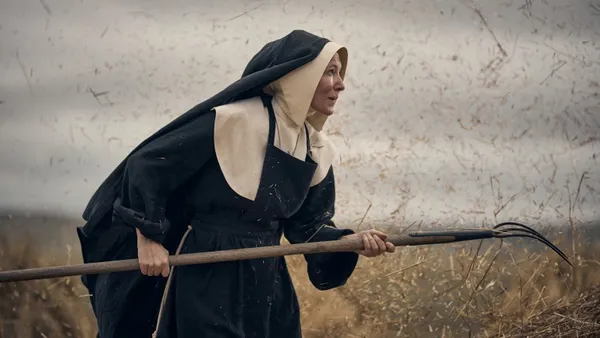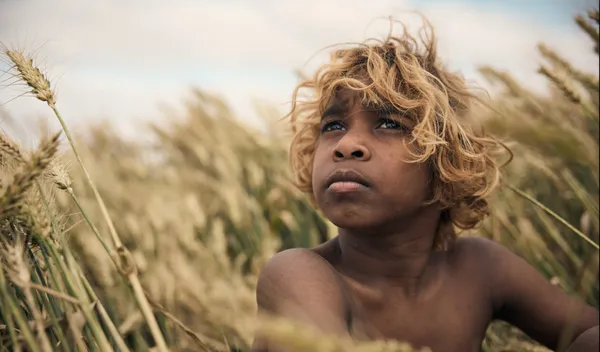Warwick Thornton's The New Boy tells the story of a young Aboriginal kid (impressive newcomer Aswan Reid) brought in a sack to a monastery in the Outback, where orphan kids are schooled and looked after. Since the death of the priest - which only the residents know about - nun Sister Eileen (Cate Blanchett) has been running the show with a caring but full-on fervour. Soon the new kid's inate spirituality comes into conflict with that of the organised ideas of the church. The film played in the Un Certain Regard selection of Cannes and, later in the year, we caught up with the filmmaker in Thessaloniki to talk about spirituality and religion, gender flipping the central role for Blanchett and the slippery significance of snakes.
I kept thinking of a film called Kanyini, which features Bob Randall talking about the idea of being connected spiritually to family and land. I thought it was so resonant with your film, the idea of spirituality that's not necessarily connected to religion. Were you thinking about that sort of thing when you were making New Boy - a deeper spirituality that hasn’t been shaped by religion?
Warwick Thorton: Absolutely. It's trying to get recognition of something that is there for indigenous people, that is always dismissed by organised religion, in a way, even though ours is organised as well. In Australia, they call it the Dreamtime - and “Dreamtime” is such an insulting word to indigenous people, because it’s like, “You dreamt it up, you made it up”, whereas, obviously, Christianity’s not called the Dreamtime, they didn’t make that up!
I grew up having a child having these incredible connections to the land and being taught the spirits and everything. And then I was sent to a monastic boarding school, run by Benedictine monks when I was 12, because I was a bit of a naughty child, a bit of a streetkid and my mother sent me there. Where you live is where you go to school, and part of that is obviously church every single day and twice on Sunday, and I’d never been into a church. When you're 12, and you've never walked into a church before, and you see Jesus up on the cross being tortured, you get really scared and it kind of freaked me out, and you start praying, because you're afraid, it’s purely fear.
As I got older, I just recognised that what I was brought up with was not that. Indigenous spirituality was celebrating the dead and celebrating spirits, good spirits - and there are bad spirits as well. I felt that was so different to what Christianity was.
The new boy’s got healing powers so he wants to heal this guy [the Jesus figure on the cross], he's in trouble. It's that sort of innocence and beauty that sort of, and that's why I get from down needs to heal him. Whereas they have to keep him up there to keep everybody shit scared.
In a way, I suppose there's two types of naivety going on. He is naive in a sense that he is innocent and young. But Cate Blanchett’s character is also quite naive, in her own way, about everything.
WT: They’re both on these two trajectories for survival and naivety can be dangerous, very dangerous. The extinction of the new boy’s spirit, the lobotomising of his soul is purely through naivety.
And her naivety is less innocent really. Also, like a lot so many things to do with colonialism a lot stems from fear.
The church is one of the worst colonisers in the world. It’s driven by disempowering the masses to empower itself in a way, it's really weird.
There’s all sorts of fears in this film. For example, the character of George has fears as well, that are almost sparked by the arrival of this kid.
WT: Yeah, it’s, “I’m on a good wicket here, boy, don’t stuff it up for me.”
That’s interesting because it goes to that sense of playing by other people's rules, doesn't it? He's agreed to play that game.
WT: Yeah, absolutely. For his survival he’s taken on the role of the farm hand. The kid’s going to threaten that survival in a way. He's chosen that path, he’s been colonised and he’s slightly angry with himself because of that.
Even though this is a historic drama, these things still resonate in terms of things that happen in today's world.
WT: We should never forget that we forget a lot.
But I feel like this film is quite a hopeful film, on some level as well. Maybe that’s a bit more of a new thing for you?
WT: Well, Samson and Delilah didn’t die, which was important when I wrote that. When I wrote that film, the characters were saying, “Don't you dare kill us because we’ve fought so hard to survive.” Not just for the audience - the pain the audience had watching that bloody movie - but for the characters as well. As I get older, I’m seeing a lot more shades of gray, rather than the classic Hollywood of drawing a line in the sand between "that’s good" and "that's evil". I don't think there's a right and wrong in this movie.
Yes, it’s not that anybody's aiming to do anything awful to anybody. Did it help that you flipped the gender of the central role? Because I know that originally the Cate Blanchett character was going to be a male priest.
WT: Yes, absolutely. It was called Father And The Son and if you’d seen that poster, and it had “a film by Warwick Thornton” underneath, you wouldn’t go and see it because you’d think, “That’s totally going to be about pedophilia”. The script never was but you can't stand in front of every cinema in front of your poster saying, “It’s not like that”.
So it kind of stagnated and a lot of district distributors and money people were, “We love the script but it’s just going to be too hard to get people through the door”. You’d have to have a $50 million print and advertising budget to just tell the world that it's not a bad film. But gender swapping is such an amazing thing. Talking to Cate, I had that script for a very long time and we were talking during Covid about how we should make a movie. Everyone was learning how to play the guitar or bake and trying to be proactive. We were trying to be proactive just on Zoom. I had that script for a very long time. Because I knew that if I wrote Kate a brand new film, it'd be like a four-year process and I thought, “I don’t know if I want to go through that right now”.
We’d only just met, too. She’d rung saying, “Life's too short, we should make a movie.” And I remembered I had that script. I went, “Have a read of this”. It still had Dom Peter - he’s still in the film now but he’s dead behind the barn. I said: “The priest’s Dom Peter but imagine we flipped it to be a nun.” Part of the problem was that everything in the film that Don Peter does, Sister Eileen does. But when you read it with Dom Peter, it was just normal, it was just a day in the life of the priest with this crazy little kid, until he starts using his magical powers. But ths Dom Peter character was almost in a retirement village. But since we gender swapped, suddenly, because nuns we're not allowed to give communion or baptise or all those things, it became exciting, because she was always looking over her shoulder. It added doubt and her fears of being found out. Obviously Dom Peter was a dickhead so she doesn’t want another priest coming to be the manly man. The dominance of that in the church.
Yes, there’s one patriarchal element missing that you would normally have in this film. The use of snakes is pretty interesting, too, because there's a lot of ambivalence about them.
WT: You know, before the British came, there were 400 different languages in Australia. And if you have a language, you kind of have your own spirituality in a strange way or connection to country. They sort of grow with each other. There's about 200 left now, but in lots of them one of the major creators is the rainbow serpent. Obviously, if you're in a traditional existence, you see a giant rainbow, it looks like a giant snake and it's carved out valleys and created mountains. You know, it's one of those sort of all-watching, judging kind of “don't do the bad thing” creatures. The new boy’s connection with snakes is that they’re little baby gods. Yeah. They're very special and sacred, in a way, whereas Western religion’s version of the snake is fear. Just looking at the different perspectives of what a snake is to different societies is really interesting.
Read part two of our interview with Thornton on working with children and animals, decluttering his filming technique and how the score went from spare to symphonic.























